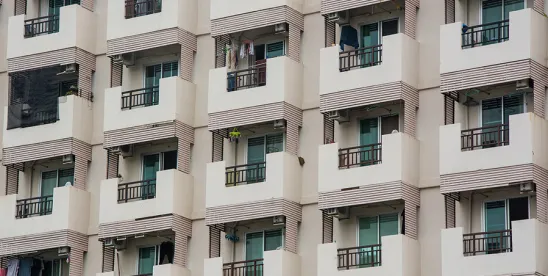Senate Bill 1103 (also known as the Commercial Tenant Protection Act) (SB 1103) introduces substantive changes affecting commercial leasing practices in California. Signed into law by Governor Newsom on September 30, 2024, and effective January 1, 2025 (unless otherwise noted below), SB 1103 establishes new restrictions on landlords that are parties to commercial leases with "qualified commercial tenants," which are certain qualifying "microenterprises," restaurants with fewer than 10 employees, and nonprofit organizations with fewer than 20 employees. In particular, the law establishes (1) restrictions/requirements for charging operating costs and tax expenses; (2) a requirement that landlords provide notice of certain increases in rent; (3) mandatory translation requirements in certain circumstances; and (4) notice requirements for termination of leases of unspecified duration. This legal alert not only summarizes the most relevant key changes to current law but also offers practical guidance for commercial landlords.
What is Commercial Real Property Leased by a Qualified Commercial Tenant?
The modifications described in SB 1103 apply only to leases for "commercial real property" leased by a "qualified commercial tenant," therefore, it is important to understand the statutory definition of each.
"Commercial real property" means all real property in [California], except dwelling units subject to [Chapter 2 (commencing with Section 1940) of Title 5 of Part 4 of Division 3], mobile homes, as defined in Section 798.3, and recreational vehicles, as defined in Section 799.29.
"Qualified commercial tenant" means (i) a microenterprise, (ii) a restaurant with fewer than 10 employees, or (iii) a nonprofit organization with fewer than 20 employees, which, in each case, has (A) provided the landlord, within the previous 12 months, a written notice that the tenant is a qualified commercial tenant and a self-attestation regarding the number of employees and (B) provided the notice and self-attestation described in clause (A) before or upon execution of the lease, and annually thereafter, at such time the protections under this section come into place. However, if the lease is from week-to-week, month-to-month, or other period less than a month, due to ambiguity in the language of SB 1103, the notice requirements under SB 1103 are less clear, and it is possible that no notice or self-attestation is required.
"Microenterprise" has the same meaning as that term is defined in subdivision (a) of Section 18000 of the Business and Professions Code. [Per subdivision (a) of Section 18000 of the Business and Professions Code, a "microenterprise" means a sole proprietorship, partnership, limited liability company, or corporation that meets both of the following requirements: (1) Has five or fewer employees, including the owner, who may be part time or full time. (2) Generally lacks sufficient access to loans, equity, or other financial capital.]
"Nonprofit organization" means any private nonprofit organization that qualifies under Section 501(c)(3) of the United States Internal Revenue Code of 1986.
Ability for a Commercial Landlord to be Reimbursed by Tenants for Building Operating Costs (Section 1950.9 of the California Civil Code):
Pursuant to new Section 1950.9 of the California Civil Code, with respect to any lease of commercial real property to a qualified commercial tenant where (1) the lease is executed (or tenancy commenced or renewed) on or after January 1, 2025; (2) the tenancy is from week-to-week, month-to-month, or other period less than a month; or (3) the lease is executed (or tenancy commenced) before January 1, 2025 but does not contain a provision regarding building operating costs, a landlord shall not charge a fee to recover "building operating costs" unless certain requirements are satisfied (including, without limitation, the provision of "supporting documentation" to such qualified commercial tenant). Such landlords also shall not alter the method or formula used to allocate building operating costs to such qualified commercial tenants in a way that increases such qualified commercial tenant's share of such costs, unless such qualified commercial tenant is provided with written notice of the change in the method or formula and supporting documentation therefor. Violating landlords can be liable for damages in a civil action. In addition, in an action for an unlawful detainer, ejectment or other action to recover possession based on a tenant's failure to pay a fee to recover building operating costs, a qualified commercial tenant may raise, as an affirmative defense, that the landlord violated Section 1950.9.
What Landlords of Commercial Real Property Should Know:
- The requirements of Section 1950.9 do not apply to all tenants – only microenterprises, restaurants with fewer than 10 employees and nonprofits with fewer than 20 employees, in each case, that satisfy the notice requirements described above.
- In addition to any new leases signed after January 1, 2025, landlords should be aware of any existing leases that have qualifying tenancies commencing after January 1, 2025 or are coming up for renewal after January 1, 2025 (or do not contain a provision regarding building operating costs, as described below).
- Building operating costs are costs incurred on behalf of a tenant for the operation, maintenance, or repair of the commercial real property, including, but not limited to, maintenance of common areas, utilities that are not separately metered, and taxes or assessments charged to the landlord pursuant to property ownership.
- A qualified commercial tenant's share of building operating costs must be allocated proportionately based on square footage or another method substantiated by landlord through supporting documentation provided to such tenant. Landlords that calculate a tenant's share of building operating costs using a method other than allocation based on square footage (including, without limitation, pursuant to certain "gross" leases or "fixed" operating cost payments) should discuss such method with Allen Matkins to confirm compliance with this Section.
- Landlords cannot charge a qualified commercial tenant for any building operating costs that were not either (i) incurred during the previous 18 months, or (ii) reasonably expected to be incurred within the next 12 months based on reasonable estimates. This effectively sets an outside date (ie., 18 months) for landlords attempting to recover building operating costs and may have implications on certain building operating costs that are subject to reconciliation or change by outside third parties. Landlords with property tax bills that do not adequately or currently reflect the value of the applicable property (as a result of a sale, redevelopment, etc.) should reach out to Allen Matkins to discuss compliance with these restrictions.
- Before executing a lease with a qualified commercial tenant, a landlord must provide such tenant a paper or electronic notice stating that such tenant may inspect any supporting documentation of previously incurred or reasonably expected building operating costs within 30 days after a written request. Landlords should include such notice within their lease documents for qualified commercial tenants. As a practical matter, landlords should ensure that they have systems in place to timely comply with any such request (including the provision of all necessary supporting documentation).
- Landlords cannot seek reimbursement of building operating costs from qualified commercial tenants for expenses "paid by a tenant directly to a third party" or "for which a third party, tenant, or insurance reimbursed the landlord" As a practical matter, these are already "market" exclusions, and many lease forms will already include this type of language as general "exclusions" from building operating costs, but landlords should particularly confirm that this exclusionary language is in place for any lease with a qualified commercial tenant. Furthermore, given the potential for liability under Section 1950.9, landlords should actually confirm that their accounting and billing systems are not actually charging qualified commercial tenants for any such prohibited building operating costs.
- Prior to collecting any amounts from qualified commercial tenants as building operating costs, landlords must provide such tenants with supporting documentation for such building operating costs.
- Prior to modifying the method or formula used to allocate building operating costs to qualified commercial tenants in a way that increases such tenant's share of those costs, landlords must provide written notice thereof with supporting documentation.
- "Supporting documentation" as used in Section 1950.9 means a dated and itemized quote, contract, receipt, or invoice from a licensed contractor or a provider of services that includes, but is not limited to, both (1) a tabulation showing how the costs are allocated among tenants (i.e., proportionately by square footage or another method substantiated through supporting documentation) and (2) a signed and dated attestation by the landlord that the documentation and costs are true and correct. Landlords should work with Allen Matkins to prepare their form supporting documentation and discuss whether the supporting documentation will support billing for estimated building operating costs on a monthly basis (or whether collecting such building operating costs will need to be done on an annual [or quarterly or other] basis following receipt of all supporting documentation).
- Landlords cannot require tenants to waive the protections of Section 1950.9 of the California Civil Code.
- The requirements of Section 1950.9 do not apply to assessments levied pursuant to Part 7 (commencing with Section 36600) of Division 18 of the Streets and Highways Code (which assessments consist of those levied by business districts in economically disadvantaged areas for the purpose of conferring special benefit upon the real property or businesses in such business districts).
- A qualified commercial tenant may raise, as an affirmative defense, that its landlord violated this Section. In addition, a landlord who violates this Section shall be liable to a qualified commercial tenant in a civil action for all of the following: (1) actual damages; (2) in the court's discretion, reasonable attorney's fees and costs; and (3) upon showing that the landlord or its agent acted willfully or with oppression, fraud, or malice, both of the following: (A) three times the amount of actual damages and (B) punitive damages.
Ability of a Commercial Landlord to Increase Rent (Amended Section 827 of the California Civil Code):
SB 1103 also amends Section 827 of the California Civil Code to provide that for all leases for commercial real property by a qualified commercial tenant, a rent increase shall not be effective until the landlord has provided the proper notice required by such Section.
What Landlords of Commercial Real Property Should Know:
- The requirements of the applicable amended portions of Section 827 do not apply to all tenants – only qualified commercial tenants that are leasing commercial real property.
- If the proposed rent increase for the tenant is 10% or less of the rental amount charged to that tenant at any time during the 12 months before the effective date of such increase (either in and of itself or when combined with any other rent increases in such 12-month period), the notice shall be delivered at least 30 days before the effective date of such increase.
- If the proposed rent increase for the tenant is greater than 10% of the rental amount charged to that tenant at any time during the 12 months before the effective date of such increase (either in and of itself or when combined with any other rent increases in such 12-month period), the notice shall be delivered at least 90 days before the effective date of such increase.
- If the proposed rent increase for that tenant is caused by a change in a tenant's income or family composition, as determined by a recertification required by statute or regulation, the notice shall be delivered at least 30 days before the effective date of the increase.
- The notice required to be delivered by this Section shall be delivered either (1) by delivering a copy to the tenant personally or (2) by serving a copy by mail under the procedures prescribed in Section 1013 of the California Code of Civil Procedure. In addition, the notice shall include information on the provisions of Section 827. Landlords preparing such notices should review the requirements of the amended Section 827 of the California Civil Code to confirm compliance and reach out to Allen Matkins with any questions.
- In all leases for commercial real property by a qualified commercial tenant, a rent increase shall not be effective until the applicable notice period has expired.
- As a general note, landlords should be aware that subdivision (b)(1) of the revised Section 827 states that such notice requirement for rent increases described in such Section is applicable to "all leases of… commercial real property by a qualified commercial tenant… from week to week, month to month, or other period less than a month," but that subdivision (b)(5) of Section 827 states that "In all leases for commercial real property by a qualified commercial tenant, a rent increase shall not be effective until the notice period required by this subdivision has expired." In other words, the revised Section 827 references leases that are week to week, month to month, or other period less than a month, but then goes on to say that the notice requirement in Section 827 applies to all leases of commercial real property by a qualified commercial tenant. The reason for such apparent inconsistency in the text of the Section is unclear, but landlords should assume for now this provision applies to all leases for commercial real property by a qualified commercial tenant (and not just leases that are week to week, month to month, or other period less than a month).
- If a state or federal statute or regulation, recorded regulatory agreement or contract provides for a longer period of notice regarding a rent increase, then the delivery of such notice shall be in accordance with such longer period.
Translation Obligations of a Commercial Landlord (Amended Section 1632 of the California Civil Code):
SB 1103 also amends Section 1632 of the California Civil Code to require, among other things, that a person engaged in a trade or business who negotiates primarily in Spanish, Chinese, Tagalog, Vietnamese, or Korean, orally or in writing, in the course of entering into (among other things) a "lease, sublease, rental contract or agreement, or other term of tenancy contract or agreement covering a nonresidential-zoned commercial space entered into between a landlord and a qualified commercial tenant, on or after January 1, 2025" to deliver to the other party to the contract or agreement, and any other person who will be signing the contract or agreement, and before the execution thereof, a translation of the contract or agreement in the language in which the contract or agreement was negotiated, that includes a translation of every term and condition in that contract or agreement.
What Landlords of Commercial Real Property Should Know:
To the extent landlords are negotiating leases with any parties that primarily speak Spanish, Chinese, Tagalog, Vietnamese, or Korean, landlords should review the requirements of the amended Section 1632 of the California Civil Code to confirm compliance and reach out to Allen Matkins with any questions (including questions relating to the other requirements of Section 1632 not summarized above).
Note that Section 1632 of the California Civil Code is subject to further modifications as provided in Assembly Bill 3281, which modifications shall only become operative if (1) both Senate Bill 1103 and Assembly Bill 3281 are enacted and become effective on or before January 1, 2025, (2) each bill amends Section 1632 of the Civil Code, and (3) Senate Bill 1103 is enacted after Assembly Bill 3281, in which case, Section 2 of Senate Bill 1103 shall not become operative.
Commercial Landlord's Ability to Terminate Leases of Unspecified Duration (Amended Section 1946.1 of the California Civil Code):
SB 1103 also amends Section 1946.1 of the California Civil Code to provide that a hiring of (among other things) commercial real property by a qualified commercial tenant for a term not specified by the parties, is deemed to be renewed as stated in Section 1945 of the California Civil Code, at the end of the term implied by law, unless one of the parties gives written notice to the other of the party's intention to terminate the tenancy as follows: (1) an owner must give written notice at least 60 days prior to the proposed date of termination (but may give written notice at least 30 days prior to the proposed date of termination if a tenant has occupied the property for less than one year) and (2) a tenant must give written notice for a period at least as long as the term of the periodic tenancy prior to the proposed date of termination. Such notice given by an owner must satisfy specific requirements set forth in the text of Section 1946.1.
What Landlords of Commercial Real Property Should Know:
This particular amended Section applies only in the event that the lease in question did not specify the length of the term of such lease. Most landlords will not have leases with unspecified terms; however, landlords that have (or are entering into) such leases should review the requirements of the amended Section 1946.1 of the California Civil Code to confirm compliance and reach out to Allen Matkins with any questions.
Section 1946.1 of the California Civil Code is subject to further modifications as provided in Senate Bill 611, which modifications shall only become operative if (1) both Senate Bill 1103 and Senate Bill 611 are enacted and become effective on or before January 1, 2025, (2) each bill amends Section 1946.1 of the Civil Code, and (3) Senate Bill 1103 is enacted after Senate Bill 611, in which case, Section 3 of Senate Bill 1103 shall not become operative.





 />i
/>i

